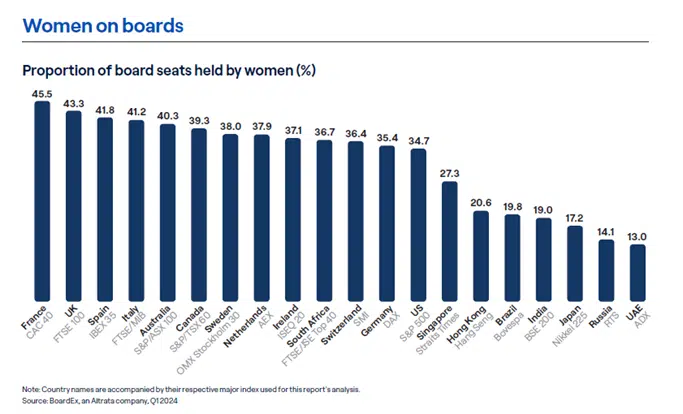Gender diversity on corporate boards and in the C-suite continues to improve, but progress remains slow.
Altrata’s latest report, Global Gender Diversity 2024, examines the degree of female representation on corporate boards and leadership teams of the Global 20 as of the first quarter of 2024. The report also explores the pipeline of female talent for future board and C-suite positions. According to BoardEx data, there is still a significant gap in women accumulating the corporate experience necessary to progress into the most senior roles.
The report finds that women now account for 32% of board members at the corporations that make up the major indices of the Global 20. France retains its leading position, with women representing 45.5% of board members in CAC 40 companies. The UK follows closely with 43.3%, and other notable performers include Spain and Australia, both joining the 40% club this year. However, the US still ranks 13th. Encouragingly, all 20 countries have shown an increase in the share of female board members since 2014, but achieving gender parity remains a distant goal.

If the rate of improvement continues at today’s pace, it will take until 2034 to reach gender parity in the boardrooms of large, listed companies. Gender parity wouldn’t be reached until 2061 among executive director roles – such as the CEO and executive chair.
Some of the findings that are examined in-depth in the report include:
- Women account for just 32% of board members and 22% of the C-suite at companies that make up the major indices of the Global 20 countries
- Large public companies in the US and UK show a slightly higher proportion of female leaders than large privately owned companies (those with an annual revenue of more than $100m)
- Board representation remains a long way from parity, but women continue to have better representation in the “oversight-centered” independent director roles – they account for 36% of such roles across the Global 20
- In contrast, a mere 12.2% of executive director roles are filled by women, and only 6.5% of CEOs are female across the Global 20
Altrata’s Global Gender Diversity 2024 report provides unique insights into gender diversity on corporate boards and leadership teams. It is essential reading for individuals at corporations, recruitment firms and anyone interested and invested in advancing the cause of talented female leaders and nurturing effective and inclusive working environments.

Maya Imberg is the Head of Thought Leadership and Analytics at Altrata. She is responsible for spearheading the company’s thought leadership efforts and overseeing its analytics and predictive modeling services commissioned by clients. She joined Altrata’s Wealth-X in 2016 as Director of Custom Research responsible for secondary research, data analytics and branded content. Maya has over fifteen years of experience in research, spanning market research, macroeconomics and financial services. Prior to joining Wealth-X, Maya held a variety of consultant and economist roles at the Economist Intelligence Unit and spent a number of years working for Datamonitor’s Financial Services practice. Maya holds an undergraduate and MSc degree in economics and comparative politics from the University of Pennsylvania and London School of Economics respectively.